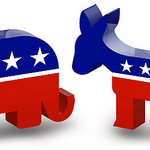This may be the shortest response I’ll ever have, as the problem is so blatant as to limit dissenting opinions.
There is just one statistical combination that needs to be shared in this discussion:
Since 1974, the reelection rate for members of congress has never dropped below 80%. In that same period, the approval rating never rose above 50% – with considerable time spent below 30%. (Currently the approval rating is at an unbelievable 14%). [Gallup poll numbers].
Americans hate their representation, yet they have consistently – over generations – put that hated representation back into office. Not to beat the issue to death, but this is due to the scale and power of government. Here’s why:
Abortion. Gay marriage. Birth Control. Drug Legalization. (Just to grab a few examples from the latest commercials this last week).
People want to force their beliefs on others. And even more than that, they don’t want others’ beliefs forced on them. They don’t vote for a senator that knows the middle east intimately; they vote their fear and hatred of the ‘other’ side. As a recovering republican, I know the feeling well. Every election the overwhelming feeling is that if this election is lost, then America will cease to exist. (Thanks Rush)
The parties exist because of the above. They can assure the poor, uneducated citizenry that if they vote for their party, then nothing bad will happen. Most people have no clue what a candidate stands for, but they do know that if they vote R then it’s more likely gay marriage won’t be legalized.
It’s as though parties have completely erased the purpose and scope of the representative. People find whichever party aligns with their morality, and they vote for whichever name is on that line.
The above issues are all important – I certainly don’t want to imply they aren’t – but they shouldn’t be the drivers for elected representatives. The purpose of a republic, classically, is to elect honorable and reliable persons to deal with the issues that will arise that require deep study and debate. Dealing with complex budgetary decisions (shifting expenses and revenues due to changing economies and populations), deep international issues (understanding the motivations of hundreds of groups of people all involved in tense, immediate situations), as well as countless others. These are the issues that a democracy just can’t handle, as they require too much research, time, and knowledge. These are the issues that should drive elections.
But when I turn on the TV, I can’t tell you which of my choices for senator has the most extensive knowledge of foreign policy. I CAN tell you which one has sponsored a bill to outlaw abortion. I can tell you which gubernatorial candidate questions marijuana legalization.
See my post last week RE: people wanting to control your thoughts and beliefs. New story, same issue.
And now, as any good political discussion should include, the solution. Remove the power from the government and suddenly you will find the issue has vanished. When people can’t force their morality on society, and when people don’t have to fear a society forcing its morality on them, then you can finally have a decent republic. A republican can choose the seasoned democratic candidate, knowing that democrat won’t try to force the left’s agenda on society.
The utopia that is Libertarianism.
Jacob Morgan
Latest posts by Jacob Morgan (see all)
- Paying for the free lunch - January 30, 2015
- I know my Rights! - October 28, 2014
- The Abilene Paradox - October 21, 2014


I think you’re right at a basic level: boundaries on what the government will legislate are helpful for promoting trust and cooperation.
But on specifics, I’m skeptical. First, people don’t reelect those they hate, it’s just that they are much more likely to see their individual representative in a favorable light and the institution as a whole unfavorably. (They hate generic “representatives” but actually like their representative.) I think this has more to do with individual psychology than the specific issues. In thinking of the abstract institution, it’s the negatives that are likely to stand out. In thinking of an individual local representative, it’s more likely that people will have the information to identify positive traits.
Yes, the parties fill an information gap: people vote the party because they know what the party stands for. But by and large, that’s not a bad way to figure out what the individual stands for. The media’s abysmal coverage of down-ballot races contributes tremendously to this problem.
One version of the representative ideal is choose statesmen (or women) who are given the freedom and authority to make ‘wise’ decisions on behalf of the less informed. But another classic model is that the representative’s job is to reflect the preferences of the voters. At least in the American system, the two have always existed in tension.
What I found most surprising here was your characterization of voting citizens. I’m not used to libertarians who suggest we have a “poor, uneducated citizenry” or that there “are the issues that a democracy just can’t handle.” I’d love to hear more, perhaps in a future post, about how you view the relationship between libertarianism and democracy.